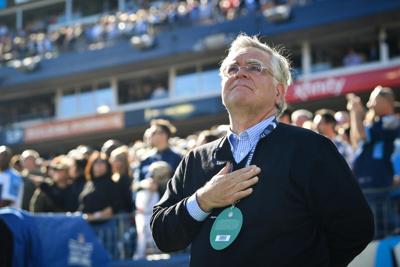
Mayor John Cooper at a Titans game in 2019
The Metro Council in the early hours of Wednesday morning voted to approve funding to build a multibillion-dollar enclosed stadium for the Tennessee Titans.
The vote followed hours of public comment and months of debate.
The financing structure for the $2.1 billion project includes $500 million in bonds from the state, $840 million from the Titans and the NFL and $760 million funded by Metro debt and repaid through an increase to the city’s hotel tax and sales tax redirects from the stadium and the surrounding campus. The proposal represents record public spending on a stadium. The city is also preparing to spend hundreds of millions of dollars on infrastructure for the surrounding East Bank, the development of which is necessary to pay back the debt on the future stadium.
Supporters said the deal would benefit the city in two key ways. One, it would free Metro from the yoke of the deal that brought the Titans to Nashville in the 1990s. That lease requires the city to maintain a “first-class” stadium for the Titans. The team estimates that would cost the city $1.8 billion through 2038, and the new deal lets Nashville off the hook for much of those obligations.
“Moving forward is the best — and indeed the only — way to tackle our city’s needs,” said Adolpho Birch III, chief external and league affairs officer for the Titans. “We have to do this deal.”
Opponents are skeptical of the team’s estimate, and an effort by Metro Council last year to seek an independent estimate of the cost of keeping Nissan Stadium “first-class” resulted instead in a review of the costs of the team’s desired improvements.
The other significant benefit cited by the team and its supporters is a newfound ability to draw to Nashville major events like the Super Bowl and the Final Four. While the plan is touted by tourism and other business representatives as a boon to the local economy, economists agree that public financing of sports stadiums does not provide a return to local governments.
Opponents cited a litany of reasons to oppose the deal: The city could instead be spending its time and resources on fundamental needs like infrastructure, transit, education and housing; environmental impacts of replacing Nissan Stadium are unknown; residents did not get a say in the negotiations; and the city should not trust the state’s contribution given the legislature’s current antagonism toward Nashville. Members of Metro Council who opposed the deal sought during multiple meetings to change the deal, largely negotiated by Mayor John Cooper and the team, including one effort to redirect portions of ticket sales to the general fund.
Local organizer Simone Boyd was among those asking for a delay.
“This deal will get better with a new mayor,” she said.
Boyd joined those calling for a citywide vote, while noting that the bonds at the heart of the stadium deal were not eligible for one.
Added Jason Freeman, a local labor organizer: “The world doesn’t end if we walk away today.”
Several councilmembers successfully sought to extend the public hearing to allow for additional public comment from opponents to the deal.
Nearing midnight, the Metro Council started its own discussion of the proposal.
On Tuesday, councilmembers considered several more late amendments to the bill, though each was shot down. Representatives opposed to the deal offered many of the same criticisms espoused by residents.
"There is no reason for us to think this is the best version of the deal," District 29 Councilmember Delishia Porterfield said.
But for weeks it has been clear that the stadium proposal had the necessary support among the members of the Metro Council. The final vote was 26-12 in favor, and a long-shot effort to reconsider the vote was unsuccessful.
"This is the right deal at the right time," said District 27 Councilmember Robert Nash.





